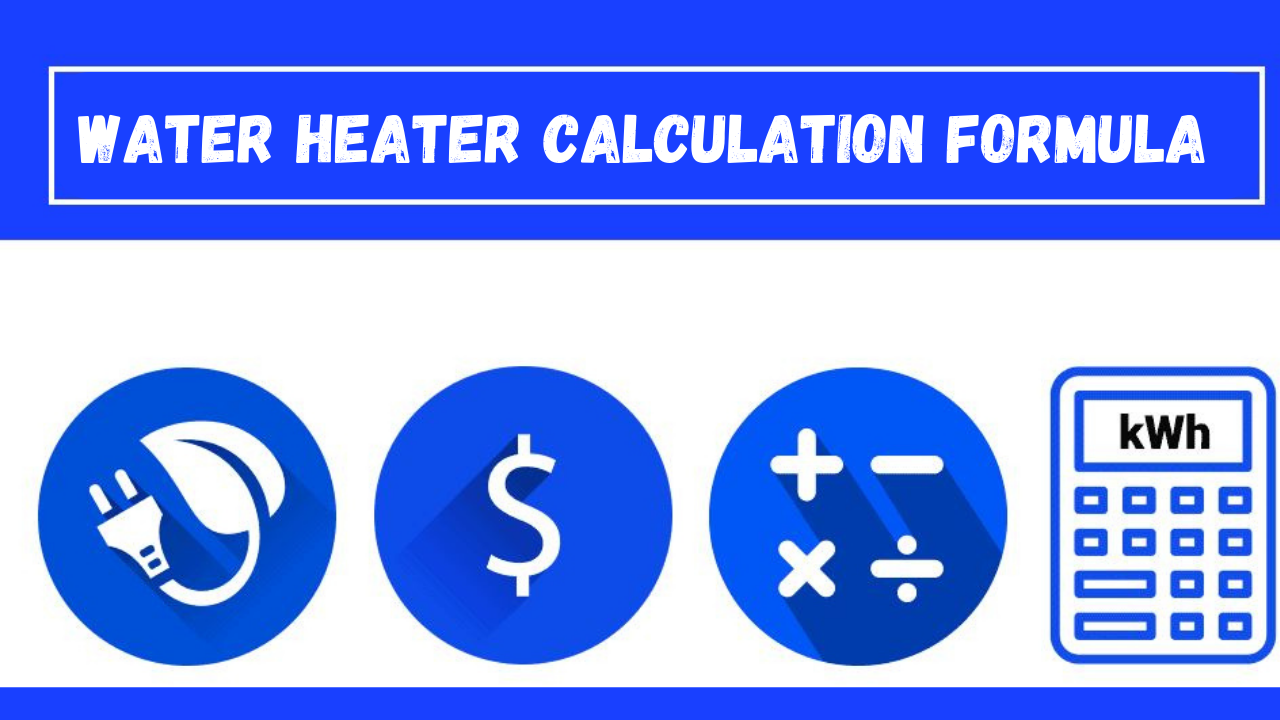The water heater calculation formula determines the correct size and capacity of a water heater needed for a specific application. It is important to accurately calculate the size to ensure an efficient and cost-effective solution.
By considering factors such as the number of people, usage requirements, and temperature rise, the formula enables homeowners to select the most suitable water heater for their needs. This calculation eliminates the risk of purchasing an undersized or oversized unit, resulting in energy savings and optimal performance.
Understanding Energy Factor
When it comes to selecting the right water heater for your home, understanding the energy factor (EF) is crucial. The energy factor is a key metric that helps you determine the efficiency of a water heater and its ability to convert energy into hot water. In this section, we will explore the definition of energy factor, its relevance to water heaters, and the industry standards for EF ratings.
Definition Of Energy Factor (ef)
The energy factor (EF) of a water heater is a measure of its efficiency in turning energy into hot water. It represents the amount of hot water produced per unit of fuel consumed over a typical day. The higher the EF, the more efficient the water heater. EF is expressed as a decimal, typically ranging from 0 to 1.
Relevance To Water Heaters
Understanding the EF of a water heater is crucial for several reasons. Firstly, a higher EF means that the water heater consumes less energy, resulting in lower utility bills. Secondly, a more efficient water heater reduces your carbon footprint by minimizing energy waste. Lastly, a higher EF often translates to faster hot water recovery, ensuring a constant supply of hot water for your household needs.
Industry Standards For Ef Ratings
The Department of Energy (DOE) has established industry standards for EF ratings to help consumers make informed decisions. The current minimum EF requirements for gas water heaters and electric water heaters are as follows:
| Water Heater Type | Minimum EF Requirement |
|---|---|
| Gas Water Heater | 0.60 |
| Electric Water Heater | 0.95 |
It is important to note that these are minimum requirements, and you may want to consider water heaters with higher EF ratings for increased efficiency.
Calculating Water Heater Usage
When it comes to calculating water heater usage, there are several factors to consider. Understanding how usage is measured, estimating average household consumption, and the impact of heater type on usage are important aspects to take into account. Let’s explore each of these factors in detail.
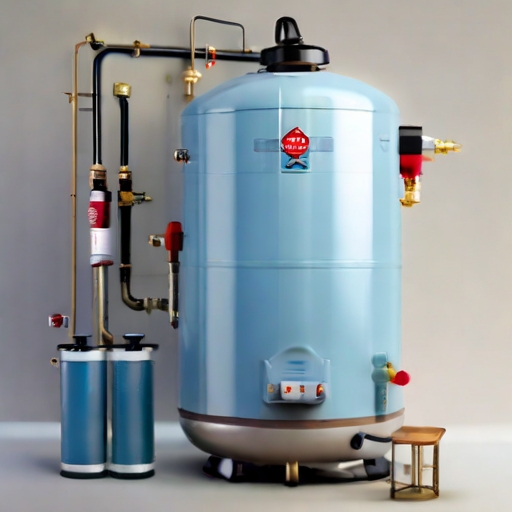
Credit: www.zazoreview.com
How Usage Is Measured
Measuring water heater usage is typically done by calculating the amount of hot water used in a specific time period. This can be determined by considering the draw volume and temperature rise.
Estimating Average Household Consumption
Estimating the average household consumption is crucial in determining the appropriate size of a water heater. By considering the number of occupants and their hot water usage patterns, you can get an idea of the daily hot water demand.
One popular method for estimating average household consumption is using the number of people in the household. According to industry standards, a general guideline is:
| Number of People | Recommended Water Heater Size |
|---|---|
| 1-2 | 30-40 gallons |
| 2-3 | 40-50 gallons |
| 3-4 | 50-60 gallons |
| 4 or more | 60+ gallons |
Impact Of Heater Type On Usage
The type of water heater you have can have a significant impact on usage. Electric heaters, for example, tend to consume more energy compared to gas heaters. This is an important consideration when calculating the overall cost and efficiency of your water heating system.
It’s also worth noting that tankless water heaters, which provide hot water on demand, can help optimize energy usage and reduce costs, as they only heat water when it is needed.
By considering how usage is measured, estimating average household consumption, and understanding the impact of heater type on usage, you can make informed decisions when it comes to choosing the right water heater for your needs.
Water Heater Calculation Formula Explained
Easily determine the size of your water heater with the water heater calculation formula. This formula helps you calculate the capacity of your hot water tank based on the number of people in your household, ensuring you have the right size for your needs.
Breaking Down The Key Formulae
Calculating the size and energy usage of a water heater is crucial to ensure adequate hot water supply and optimize energy efficiency in your home. Understanding the water heater calculation formula is the first step in making informed decisions when it comes to selecting the right water heater for your needs. Let’s start by breaking down the key formulae involved in this calculation:
1. BTU (British Thermal Units) Calculation:
The BTU calculation is used to determine the heat output required to heat water in a given time period. The formula for BTU calculation is:
BTU = Flow Rate (GPM) x Temperature Rise (°F)
2. Energy Usage Calculation:
To determine the energy usage of a water heater, we need to consider the mass of water heated, specific heat, and temperature change. The formula for energy usage calculation is:
Energy Usage = Mass of Water (kg) x Specific Heat x Temperature Change (°C)
Variables In Energy Usage Calculations
When calculating the energy usage of a water heater, several variables should be taken into account:
- Mass of Water: The amount of water to be heated, usually measured in kilograms (kg).
- Specific Heat: The amount of energy required to raise the temperature of water by one degree Celsius (°C).
- Temperature Change: The difference in temperature between the incoming cold water and the desired hot water.
Sample Calculations For Clarity
To further illustrate how the water heater calculation formula works, here are a few sample calculations:
Example 1:
Let’s say you have a water flow rate of 2 gallons per minute (GPM) and a temperature rise of 30°F. The BTU calculation would be:
BTU = 2 GPM x 30°F = 60 BTU
Example 2:
Suppose you have 200 kilograms of water, a specific heat of 4.18 J/g°C, and a temperature change of 40°C. The energy usage calculation would be:
Energy Usage = 200 kg x 4.18 J/g°C x 40°C = 33,440 J
These are just simple examples to give you an idea of how the formulas work. In practice, there may be additional factors to consider, such as insulation and recovery rate, which can affect the efficiency and sizing of a water heater.
By understanding the water heater calculation formula and its variables, you can make more informed decisions when it comes to choosing the right water heater size and maximizing energy efficiency in your home.
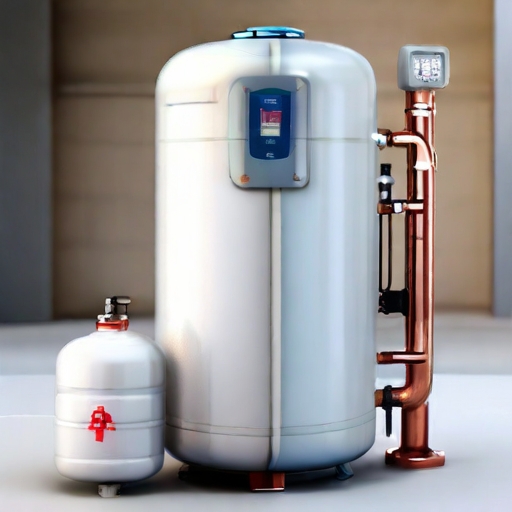
Credit: www.zazoreview.com
Water Heater Efficiency Optimization
Improving the efficiency of your water heater not only helps you save on energy costs but also reduces your carbon footprint. By optimizing the efficiency of your water heater, you can ensure that you have hot water whenever you need it without wasting energy. In this article, we will discuss strategies to improve water heater efficiency, compare tank vs. tankless models, and provide maintenance tips for peak performance.
Strategies To Improve Efficiency
There are several strategies you can implement to improve the efficiency of your water heater:
- Insulate your water heater tank to minimize heat loss. This can be done using an insulating blanket or jacket that wraps around the tank, reducing standby heat loss.
- Set your water heater temperature to an energy-efficient setting, typically around 120 degrees Fahrenheit. Higher temperatures require more energy to maintain and increase the risk of scalding.
- Install low-flow fixtures and aerators to reduce hot water consumption. This helps to minimize the amount of water your water heater needs to heat and improves overall efficiency.
- Regularly flush and clean your water heater to remove sediment buildup. Accumulated sediment can hinder heat transfer and reduce efficiency.
Comparing Tank Vs. Tankless Models
When it comes to water heater efficiency, there are two main types to choose from: tank and tankless models.
Traditional tank water heaters store and heat a large volume of water, constantly keeping it hot and ready for use. While they may have a lower upfront cost, they can be less efficient due to standby heat loss and the need to constantly reheat the water.
Tankless water heaters, on the other hand, heat water on-demand as it flows through the unit. This eliminates standby heat loss and can result in higher efficiency. However, tankless models have a higher upfront cost and may have limitations in terms of simultaneous hot water usage.
Maintenance Tips For Peak Performance
Maintaining your water heater is essential for ensuring optimal performance and efficiency:
- Regularly check for leaks and repair any issues promptly. Leaks can waste water and energy.
- Test the pressure relief valve to ensure it is functioning correctly. This valve helps release excess pressure and prevents potential safety risks.
- Inspect and clean the burner or heating element. Over time, sediment buildup can affect their efficiency.
- Consider scheduling professional maintenance annually to address any potential issues and extend the lifespan of your water heater.
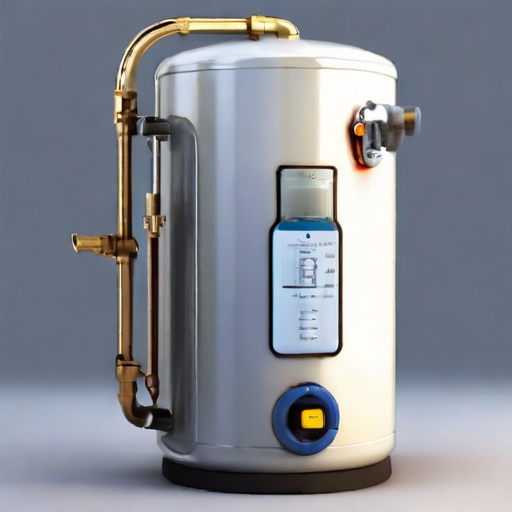
Credit: www.zazoreview.com
Estimating Water Heater Running Costs
Estimating the running costs of a water heater is an essential step in managing household expenses. By understanding the factors that affect operational costs and utilizing a calculation formula, homeowners can gain insight into their water heating bills and take steps to reduce them. In this section, we will explore the factors that influence operational costs, discuss the calculation formula for estimating costs, and provide tips for reducing water heating bills. Water Heater Calculation Formula
Factors Affecting Operational Costs
Several factors impact the operational costs of a water heater, including:
- Energy Source: The type of energy used by the water heater, such as electric, gas, or solar, plays a significant role in determining operational costs. Each energy source has different rates and efficiencies that can affect overall expenses.
- Water Heater Efficiency: The efficiency of the water heater itself is crucial in minimizing operational costs. Higher efficiency models tend to use less energy and, therefore, result in lower running costs.
- Water Consumption: The amount of hot water used in a household directly impacts operational costs. Larger families or those with higher water consumption habits may require a larger water heater and experience higher running costs.
- Climate: The climate in which the water heater operates can affect the energy required to heat the water. Colder climates may require more energy to reach the desired temperature, resulting in higher running costs.
- Temperature Settings: The temperature at which the water heater is set can also impact operational costs. Higher temperature settings can lead to increased energy usage and higher bills.
Considering these factors allows homeowners to make informed decisions about their water heating systems and estimate their running costs more accurately.
Using Calculation Formula For Cost Estimation
Estimating water heater running costs can be done using a simple calculation formula:
Running Cost = Energy Consumption (kWh) x Energy Rate ($/kWh)
To determine the energy consumption, multiply the power rating of the water heater (in kilowatts) by the time it operates (in hours). The energy rate is the cost per kilowatt-hour (kWh) charged by the energy provider.
For example, suppose a 2,000-watt water heater operates for 3 hours a day, and the energy rate is $0.12 per kWh. The calculation would be as follows:
Energy Consumption = 2 kW x 3 hours = 6 kWhRunning Cost = 6 kWh x $0.12/kWh = $0.72
Using this formula helps homeowners estimate the running costs of their water heaters and allows for effective budgeting. Water Heater Calculation Formula
Tips For Reducing Water Heating Bills
Reducing water heating bills is a practical way to lower overall energy expenses. Consider the following tips to minimize water heating costs:
- Lower the temperature setting on the water heater. For most households, setting the temperature to around 120°F (49°C) provides comfortable hot water while reducing energy consumption.
- Insulate the water heater and hot water pipes to minimize heat loss. Proper insulation can help retain the heat within the system, reducing the frequency of reheating and overall energy usage.
- Install low-flow fixtures and aerators to decrease water consumption. These devices limit the flow of water while maintaining adequate pressure, reducing the amount of hot water required and, subsequently, lowering energy costs.
- Consider upgrading to a high-efficiency water heater. Newer models often feature improved insulation, better energy efficiency, and advanced heating technologies that can significantly reduce operational costs.
- Schedule regular maintenance for the water heater. Ensuring that the system is operating optimally can prevent any inefficiencies that may lead to excessive energy usage and higher bills.
Implementing these tips can make a noticeable difference in water heating costs and result in long-term savings for homeowners.
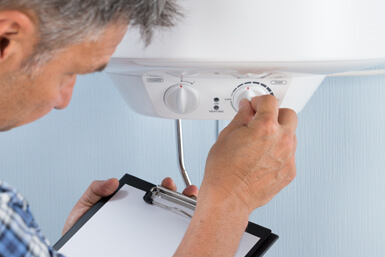
Credit: www.directenergy.com
Frequently Asked Questions On Water Heater Calculation Formula
How Do I Know What Size Water Heater I Need?
To determine the size of water heater you need, use the following formula: 1. Calculate the amount of hot water needed: Multiply the gallons per minute (GPM) flow rate by the desired temperature rise (∆T). 2. Determine the storage capacity: Multiply the hot water usage per hour by the peak hour demand.
3. Consider the recovery rate: Ensure the water heater can keep up with demand by comparing the recovery rate to the peak hour demand. By following these steps, you can accurately determine the size of water heater required for your needs.
How Do You Calculate Hot Water Heat?
To calculate hot water heat, multiply the draw volume in gallons (GPH) by the temperature rise (∆T) in degrees Fahrenheit. The result is the heat content of the water delivered at the fixture.
How Do You Calculate Water Heater Usage?
To calculate water heater usage, multiply the draw volume in gallons (GPH) by the temperature rise (∆T) and the specific heat of water. Divide by the total energy to determine the water heater efficiency. Use online calculators or the formulas provided to find the time, energy, and power required for water heating.
How Do I Calculate The Capacity Of My Hot Water Tank?
To calculate the capacity of your hot water tank, consider the number of people in your household. Generally, a water heater size is determined by the number of occupants: 1-2 people = 30-40 gallons, 2-4 people = 40-50 gallons, 5 or more people = 50-80 gallons.
Conclusion
Determining the right size water heater for your home is crucial for ensuring optimal performance and energy efficiency. By using the water heater calculation formula and considering factors such as the number of people in your household and the desired temperature rise, you can accurately determine the capacity and heating time needed.
Additionally, utilizing online water heating calculators can further simplify the process and provide valuable insights. Remember to consider both electric and natural gas options, as well as the water heater’s efficiency, to make an informed decision.

I am a Water Heater specialist writer and blogger based in the USA & UK. I have been working with Water Heater for six long years. And I give trips on various Water Heater problems and solutions. I have a lot of experience with Water Heater And I share them here

